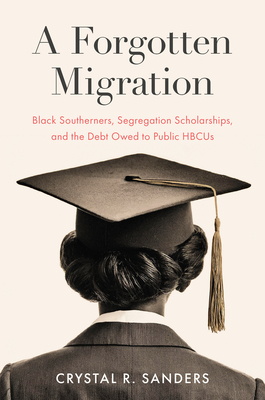
Sanders, Crystal R.
product information
description
8A Forgotten Migration tells the little-known story of "segregation scholarships" awarded by states in the US South to Black students seeking graduate education in the pre-Brown v. Board of Education era. Under the Plessy v. Ferguson decision, decades earlier, southern states could provide graduate opportunities for African Americans by creating separate but equal graduate programs at tax-supported Black colleges or by admitting Black students to historically white institutions. Most did neither and instead paid to send Black students out of state for graduate education.
Crystal R. Sanders examines Black graduate students who relocated to the North, Midwest, and West to continue their education with segregation scholarships, revealing the many challenges they faced along the way. Students that entered out-of-state programs endured long and tedious travel, financial hardship, racial discrimination, isolation, and homesickness. With the passage of Brown in 1954, segregation scholarships began to wane, but the integration of graduate programs at southern public universities was slow. In telling this story, Sanders demonstrates how white efforts to preserve segregation led to the underfunding of public Black colleges, furthering racial inequality in American higher education.
Crystal R. Sanders examines Black graduate students who relocated to the North, Midwest, and West to continue their education with segregation scholarships, revealing the many challenges they faced along the way. Students that entered out-of-state programs endured long and tedious travel, financial hardship, racial discrimination, isolation, and homesickness. With the passage of Brown in 1954, segregation scholarships began to wane, but the integration of graduate programs at southern public universities was slow. In telling this story, Sanders demonstrates how white efforts to preserve segregation led to the underfunding of public Black colleges, furthering racial inequality in American higher education.
member goods
No member items were found under this heading.
listens & views

KENNETH MCKELLAR'S BOOK OF HYMNS ...
by MCKELLAR / TURNER / MCPHEE / CHOIR OF PAISLEY
COMPACT DISCout of stock
$10.99

NEW CENTURY FLUTE CONCERTOS
by HOFMEYR / TREVISANI / KOORNHOF / DUARTE / ORBELIAN
COMPACT DISC$17.75
Return Policy
All sales are final
Shipping
No special shipping considerations available.
Shipping fees determined at checkout.





